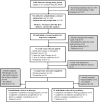Association between antepartum depressive symptoms and prenatal care utilization and milestones: a retrospective cohort study
- PMID: 40181309
- PMCID: PMC11969695
- DOI: 10.1186/s12884-025-07489-0
Association between antepartum depressive symptoms and prenatal care utilization and milestones: a retrospective cohort study
Abstract
Background: To evaluate the relationship between antepartum depressive symptoms and prenatal care utilization and completion of prenatal care milestones, namely, routine screening tests and vaccinations in pregnancy.
Methods: This retrospective cohort includes pregnant individuals who completed first or second trimester screening using the Edinburgh Postnatal Depression Scale (EPDS) between 2020 and 2021. Baseline characteristics were compared between individuals who screened positive versus negative for depression. Multivariable logistic regression models were used to estimate odds of completing third trimester prenatal care milestones, including sexually transmitted infection screening, glucose tolerance testing, group B streptococcus testing, and tetanus toxoid, reduced diphtheria toxoid, and acellular pertussis (Tdap) vaccination.
Results: Of 718 individuals who completed the EPDS in early pregnancy, 85 (11.8%) screened positive for depressive symptoms. A greater proportion of these individuals were younger (median age 28 vs. 31 years, P =.034), unpartnered (P =.005), publicly insured (P =.013), had a history of substance use (P <.001) or prior psychiatric diagnosis (P <.001), and entered prenatal care at later gestational ages (median 12.3 vs. 10.7 weeks, P =.002) than those who screened negative. Although there were no significant differences in total prenatal care visits attended between groups (P =.123), the adjusted odds of completing third trimester milestones including glucose tolerance testing (OR [95% CI] 0.60 [0.36-0.98]) and group B streptococcus testing (OR 0.56 [0.33-0.95]) were lower among individuals who screened positive for depressive symptoms. Less than half of individuals at risk for depression who were referred to mental health services successfully completed consultations during pregnancy.
Conclusions: Pregnant individuals who screen positive for depressive symptoms in early pregnancy comprised a socially vulnerable group at risk of missing third trimester prenatal care milestones. Mental health screening and integrated interventions across the perinatal continuum may help mitigate the current treatment gap for patients in need of mental health services during pregnancy.
Keywords: Depression; Glucose tolerance testing; Group B streptococcus testing; Mental health; Prenatal care.
© 2025. The Author(s).
Conflict of interest statement
Declarations. Ethics approval and consent to participate: This study received ethical approval by the Institutional Review Board at Johns Hopkins Medicine (IRB#00310626). Waiver for informed consent was obtained. Consent for publication: Not applicable. Competing interests: The authors declare no competing interests.
Figures
Similar articles
-
Association between antepartum admission and postpartum depressive symptoms.Am J Obstet Gynecol MFM. 2024 Dec;6(12):101518. doi: 10.1016/j.ajogmf.2024.101518. Epub 2024 Oct 16. Am J Obstet Gynecol MFM. 2024. PMID: 39424277
-
Anxiety, depression, and mental health service use among pregnant adolescents/young adults at an urban pediatric hospital based clinic.Clin Child Psychol Psychiatry. 2025 Jul;30(3):683-698. doi: 10.1177/13591045251341007. Epub 2025 May 15. Clin Child Psychol Psychiatry. 2025. PMID: 40375641
-
Metformin for women who are overweight or obese during pregnancy for improving maternal and infant outcomes.Cochrane Database Syst Rev. 2018 Jul 24;7(7):CD010564. doi: 10.1002/14651858.CD010564.pub2. Cochrane Database Syst Rev. 2018. PMID: 30039871 Free PMC article.
-
Prenatal exposure to HIV pre-exposure prophylaxis and birth, growth, and social-emotional developmental outcomes throughout early childhood in Kenya: a prospective cohort study.Lancet Glob Health. 2025 Mar;13(3):e467-e478. doi: 10.1016/S2214-109X(24)00471-6. Lancet Glob Health. 2025. PMID: 40021305 Free PMC article. Clinical Trial.
-
First trimester ultrasound tests alone or in combination with first trimester serum tests for Down's syndrome screening.Cochrane Database Syst Rev. 2017 Mar 15;3(3):CD012600. doi: 10.1002/14651858.CD012600. Cochrane Database Syst Rev. 2017. PMID: 28295158 Free PMC article.
References
-
- Woody CA, Ferrari AJ, Siskind DJ, Whiteford HA, Harris MG. A systematic review and meta-regression of the prevalence and incidence of perinatal depression. J Affect Disord. 2017;219:86–92. - PubMed
-
- Slomian J, Honvo G, Emonts P, Reginster JY, Bruyère O. Consequences of maternal postpartum depression: A systematic review of maternal and infant outcomes. Womens Health (Lond). 2019 Apr 29 [cited 2023 Aug 22];15:1745506519844044. Available from: https://www.ncbi.nlm.nih.gov/pmc/articles/PMC6492376/ - PMC - PubMed
-
- Jones E, Coast E. Social relationships and postpartum depression in South Asia: a systematic review. Int J Soc Psychiatry. 2013;59(7):690–700. - PubMed
-
- Vliegen N, Casalin S, Luyten P. The course of postpartum depression: a review of longitudinal studies. Harv Rev Psychiatry. 2014;22(1):1–22. - PubMed
MeSH terms
LinkOut - more resources
Full Text Sources
Medical
Miscellaneous


